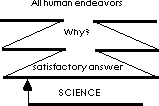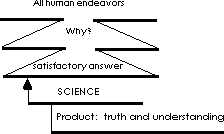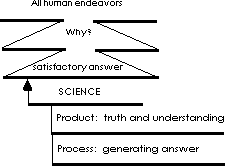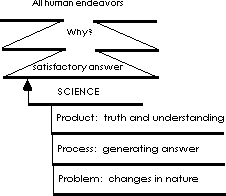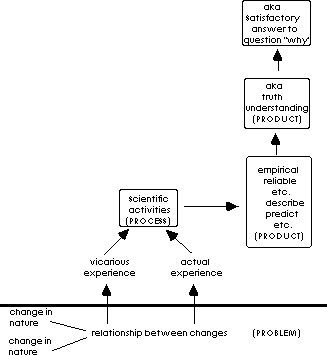


II. The Context Within Which Science Exists
A. The Universal Set: All Human Endeavors
All possible human endeavors include such things as art, war, fishing or love.
B. Set of Interest: Search for Answer to Question “Why?”
We choose one of those activities. We choose the human activities which can be labeled the search for an answer to the question “why?”
Many things pique our interest. We want to know why butterflies change, why the sun rises, why we live, why we have war, or why we love. Some people want to indulge their curiosity and discover exactly why these things are the way they are or how they can be changed to better mankind.
C. Subset of Interest: Only Satisfactory Answer
It's not appropriate to stop with answers which are lies, or which may or may not be the truth. We want the truth, the whole truth and nothing but the truth. If the answer is only a guess, we want to know that it's only a guess.
1. What Produces Satisfactory Answer: Science
In the last chapter we logically developed the case for why science is nothing less than the name for the production of what are generally considered "satisfactory" or "acceptable" answers.
It would be helpful at this point to recall the extended definition of science presented in Chapter 1, so that we can see that science is the name for the production of satisfactory answers.
a. Review: The Product of Science: Truth and Understanding
multiple converging evidence
operational/functionally defined
b. Review: The Process of Science: Generating Satisfactory Answers
To further elaborate the point that science produces satisfactory answers, we also recall the process which produces that product by documenting science's definition.
i. Characteristics of What Science Is and Does (its definition)
c. Preview: The Problem Addressed by Science: Changes in Nature
Finally, to even further elaborate science, we preview (Chapter 3) the "problem" to which science addresses itself by considering the meaning of the term knowledge.
i. Knowledge is Understanding the Covariances in Nature
knowledge via actual experience
knowledge via vicarious experience
D. Summary: Of all Human Endeavors, Truthfully Answering Why is Labeled Science
Science is the human endeavor which asks why things are the way they are, and which answers that question with a valid integrated answer. Science best answers "why" and therefore best answers how to fix what's wrong and how to make things ideal. People who have wanted to understand and who demanded the truth have given us humanity and the freedom to enjoy it.



Date Last Reviewed : November 17, 2002





